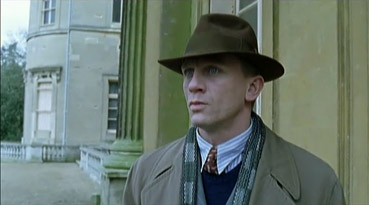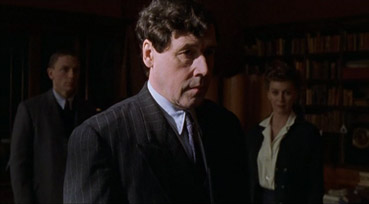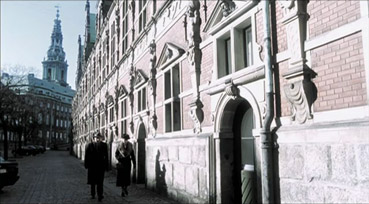| |
"The release of atom power has changed everything except our way of thinking...the solution to this problem lies in the heart of mankind. If only I had known, I should have become a watchmaker." |
| |
The woeful and somewhat regretful genius, Albert Einstein |
Perhaps there are several more theoretically terrifying stories than this one but not on this planet. Hear me out. There was a man called Neils and a younger man called Werner, two nice, ordinary names for two, well-meaning but extraordinary men. These were men who, given a little time, could have brought the world to Armageddon. One of them contributed to the American development of the atom bomb and Japan paid the ultimate price at the end of the second world war (two full stops of unspeakably destructive power were unleashed). But were it not for some small, skewed aspects of fate and timing, Nagasaki and Hiroshima would not be so well known and in their stead it would've been either London or Berlin… And perhaps these explosions would have not been full stops it they had been targeted at London. Who knows how the mushroom clouds might have multiplied. Either result, real or imagined is unspeakably horrific but just try to imagine if Hitler had won the atomic race and what sort of world we'd all be living in right now.
Two men did more than imagine. Neils Bohr, the older of the two, was a Danish physicist, a genius and a rigorous man of science and conscience. He won a Nobel Prize in 1922 for his illumination of the microscopic world and its attendant radiation. Werner Heisenberg was similarly gifted and came to be regarded as Bohr's protégé and even surrogate son. Bohr and Heisenberg met at a lecture at which the former was heckled by the bumptious upstart. Bohr had the good sense to accept Heisenberg's criticisms – mainly because they were true. You can't argue with maths. The two men became fast friends. They had found like minds that pushed and encouraged each other to greatness. It was said that these two giants in their field often did their best work whilst together, probing and teasing each other's arguments and suppositions into fruitful and mind-boggling existence. Their expertise was in a discipline that few understood and those that claimed to were and are often mistaken.
Theirs was the world of physics, atomic and sub-atomic particles and theoretical ideas that could alter the world for good or bring it to the very edge of destruction. We are talking mathematics here that only the very gifted can perceive. There is no idiots' guide to quantum mechanics because no idiots can hope to grasp its complexity nor its fiendish illogic (so that's me down and out). If I can dare to illuminate; essentially at the atomic and sub-atomic level, all 'broad' assumptions about how matter works goes out of the theoretical window. It was like discovering gravity was turned off if you went small enough. The rule book was in tatters and new rules had to be invented.

Then an event occurred that drove the men apart, an event that redefined their previously close relationship. Heisenberg and Bohr were now respective representatives of the Nazi's invading army and one of Europe's occupied countries. The event, of course, was Hitler's rise to power and subsequent world war in 1939. It is ironic indeed that Hitler may have easily won the second world war had his hatred of Jews been tempered with rational good sense. The science in which the Germans were excelling could have helped Hitler enormously but the racist mindset cannot appreciate nor consider rationality. The 'Jewish Science' was discarded and those that felt the rustle of the prevailing wind fled their homeland to be embraced in the U.S. where nationality meant nothing if you were brilliant in scientific areas.
In some senses, it was the Germans who put the first man on the moon. The Americans just had the sense to recognise the Germans' inestimable worth. Hitler didn't. America tempted Werner Heisenberg but despite his peaceable leanings, he was a patriot who'd lived in poverty during Germany's worst period (the end of the first world war) and had no intention on deserting his homeland when he had a chance to make the country great again. After the war Neils Bohr did work in America (not too many people are able to argue physics with Einstein but Bohr was one) and contributed to the research of the bombs that annihilated Hiroshima and Nagasaki.
On a personal note, I was lucky enough to meet and work with the RAF observer who flew over those doomed Japanese cities in the bombers that delivered the payload. What he saw changed his life. Consequently, Group Captain Leonard Cheshire devoted the rest of his life to the easing of human suffering setting up care homes in the UK and abroad ('Cheshire homes' with his wife Sue Ryder, a famous name in the charity arena). I was working on a documentary about his recently set up Cheshire homes in India. He suggested a friend of his come in to the cutting room to help out. The editor and I were not impressed with the idea that someone could come in and teach us our jobs... Then in walked David Lean... Uh, right. It took us weeks to finish that humble pie.
And so the two brilliant physicists found themselves on opposite sides of an awful divide, the line that separates the conqueror from the conquered. Neils Bohr (nervously part Jewish) in Copenhagen, Denmark, was a virtual prisoner in his own home. While his country was occupied by Hitler's armies, Bohr enjoyed a certain freedom based on his intellectual celebrity but was still strait jacketed in terms of any ongoing research, something he had to do furtively. His eventual escape from Nazi occupied territory in 1943 was fraught (this was the height of the holocaust) and he came close to being swept away by the forces that had so disgusted the rest of the world with their specific anti-Semitic brutality. On the other side, his good friend Heisenberg was embraced by the ruling Fascist party and despite the tortuous moral complexity of working for a state that any sane person would abhor, Heisenberg was more interested in ideas than ideology. And the big idea in the late 30s and early 40s was the atom and atomic power. Let that sink in. In the first years of the second world war, Hitler engaged some of the most brilliant scientific minds on Earth to find a way to make nuclear fission produce energy. Even Bohr was convinced that it was theoretically and practically impossible to build an atomic bomb but what of Heisenberg? Would his intellectual rigor be able to stand back and see what might be wrought, arming the Nazis with nuclear weapons? This was the dilemma that sent Heisenberg out of Germany to see his friend Bohr in 1941.

Both men fell out spectacularly after this meeting and no one knows exactly why. Playwright, Michael Frayn, quite rightly, saw great dramatic potential in this surreptitious meeting and the result was his play Copenhagen. The excellent Public Broadcasting Service (PBS) in the US, together with the BBC funded a TV Movie of the play in 2002 and it's a cracker. The cast is first rate. Stephen Rea (best known from Neil Jordan's work) plays Bohr with a studied calm and a promise of balled up rage and indignation. There has been a very great effort to cast look-alikes and as with the superb BBC's Horizon dramatization Life Story, the two male leads bear uncanny resemblances to the men they are playing. Looking bright eyed and big eared as Werner Heisenberg is Daniel Craig and lest we forget that while his talent happily shoulders the Bond persona, he is utterly convincing as the socially awkward genius tortured somewhat by a moral panic. Frayn suggests that even Heisenberg did not know why he sought Bohr's advice and company (which is somewhat ironically ironic considering Heisenberg's place in history is assured from his "Uncertainty Principle").
Playing a detached but keenly involved observer is Bohr's wife, Margrethe. Played by Francesca Annis (so fetching in a Fremen suit in Dune), Margrethe is the film's moral compass and humanising force. Yes, the relationship between Bohr and Heisenberg is the key to the drama but by including Bohr's wife in the play, Frayn makes the moral choices on offer more significant and not just an intellectual exercise between two men with theoretical power to lay waste to continents. Margrethe is key in allowing both men to understand their own humanity and not just rely on those enormous minds which are as incapable of un-knotting the moral questions as they are capable of advanced mathematics.
Yes, the play's origins (duh, a stage play) are not fully thrown to the winds of cinematic expression but it is a drama about moral choices and visually that's a bastard to pull off and adapter and director Howard Davies does an admirable job in taking three folks yakking and giving it enormous weight and thoughtfulness and an eerie whisper of truth. Frayn's imagination does not fully nail down what words were exchanged that so enraged Bohr but instead provides the essence of a possible and probable exchange by allowing the men (and woman) to meet as ghosts, to rake over the cooler coals of heated debates long since gone by. If you enjoy intellectual cut and thrust being kneecapped by our own frailties as human beings then you will find a great deal to recommend in Copenhagen.
Presented in what the DVD says is "a 1.85:1 Widescreen Aspect ratio," the movie is in fact letterboxed which is a shame. I have failed to find out if the movie was shot on 16mm or 35mm (not something I can tell from DVD quality) but am fairly sure it originated on film. The quality is solid if a little iffy at certain moments but that's an NTSC being played on PAL equipment issue. The picture felt a little weak in certain areas (which could be the intention of the grading at certain points).

This Region 1 only DVD has a very subtle and pleasing sound mix, a Dolby Digital 'Stereo' as the sleeve notes tell us but is rendered in a very nice surround by my amplifier which confirms it's a Pro Logic mix. The near total absence of sub-woofery leads me to believe the film-makers simply didn't need its effects but this is a filmed play and dialogue is all important and recorded and mixed very well. There is never an issue with understanding what's being said.
The sleeve says the DVD is "captioned for the hearing impaired" – or so it would have us believe but in three different DVD Players, I could find no menu option or remote control button that succeeded in summoning up the mentioned subtitles. The default and only subtitle setting was 'Subtitle Off'. Infuriating.
The DVD also has an auto-play feature which includes both Extra Features played as a default and the menu is chapter list basic with no other audio-visual options.
There is an excellent Prologue (10:30) and Epilogue (11:55) that both place the events in their historical context. Playwright Michael Frayn provides the spines of both and there are numerous contributions from other physicists and the assistants and relatives of both Bohr and Heisenberg. It's a fascinating accompaniment to the movie and in some respects a necessary one. Too often, historical events are presented without context or a blithe acceptance that our morality is bolted to 'theirs'. Not so in this case which is to the film-makers' credit.
An excellent and thought provoking movie, a bit too visually static but then taken from a play, you'd hardly expect otherwise. The performances are superb across the board and the implications of the film still make you shudder. Bravo.
|